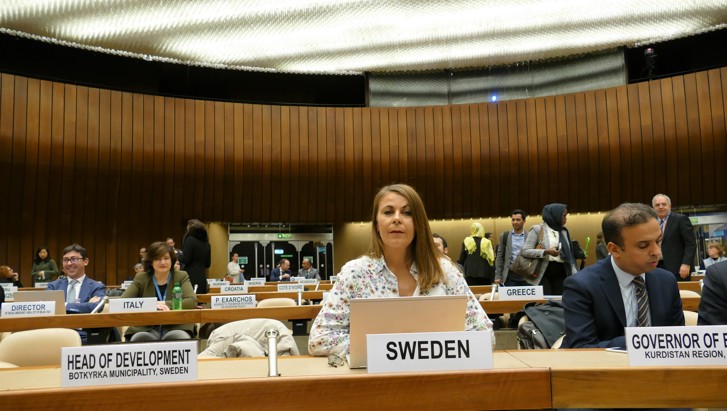On 18 and 19 December 2018, UN High Commissioner for Refugees Filippo Grandi hosted the eleventh High Commissioner’s Dialogue in Geneva. This year the Dialogue focused on the role of cities in protecting and finding solutions for displaced persons in urban contexts, and building sustainable, peaceful and resilient cities. Over half of the world’s 25.4 million refugees live in cities and urban areas today, and this trend of urbanization is increasing. We meet Head of Development from Botkyrka municipality, Ms Helena Rojas, after her participation in the Europe roundtable discussion on protection challenges – one of many sessions for focused discussion during this year’s Dialogue. Botkyrka, municipality in the Stockholm region, is engaged in the Council of Europe’s city network for Intercultural Cities (ICC) - a growing, global network of municipalities that are embracing the opportunities that diversity bring. The network has a special focus on refugees and undocumented persons in practices of several cities, within the concept of urban citizenship.

The concept of urban citizenship is central to the work in Botkyrka on intercultural and cross-sectoral approaches to refugees. is. This way of thinking about identity and belonging in a city context offers a strong focus on inclusion and creative local responses. It also relates well to the comprehensive, multistakeholder and inclusive ways of working in displacement situations that are central to the new Global Compact on Refugees, adopted by the General Assembly on the 17th of December.
Read below Ms Rojas’ answers on Botkyrka’s progressive ways of managing reception and inclusion of refugees.
Q: Botkyrka is a strong voice for progressive refugee reception and inclusion in Sweden. You are moving from traditional to intercultural approaches in order to do this, through a cross sectorial ways of working. Tell us more about this approach and your idea of urban citizenship and what the challenges and benefits are.
A: In Botkyrka we have come to a point where we realize that our ways of structuring welfare and our role as welfare provider might not be efficient enough to address complex issues that have many casual links. This requires that our systems are more flexible and that we do things that we know work, not only think or believe works. We also understand that as a municipality we have our limitations in reaching out to different groups of people and understanding what needs to be offered and in which way.
In addition to this we have started asking ourselves critical questions regarding the construction of our system, i.e. why do we do thing the way we do – is it because it’s most efficient and good for our citizens or is it because we are used to deal with things in certain ways and continue to reproduce ourselves, adapting old solutions to new situations? This will not give us other results than the ones we have seen so far. We are open to trying different approaches and ways of working where we learn also to be a partner and co-creator, giving possibilities to people and local actors to be active and build more sustainable, inclusive and rights based societies.
Today, many in municipalities are not working with and for all people that live in our cities. We focus on the people we say we have a responsibility to protect, based on interpretations of principles in our welfare system. But from a human rights point of view we have a basic responsibility to work with and for all individuals existing in our city regardless of their status.
To rethink structures, approaches and way of working with people requires time, hard work and changes in culture and methods within the municipal structure. This is a challenge that needs to be overcome and dealt with!
Another issue is connected to finances. Does working with the concept of urban citizenship mean increased municipal costs or can we make our structures more efficient and available for everyone without exceeding budgets?
Q: The UN General Assembly has just agreed to a historic Global Compact on Refugees, which particulary focuses on comprehensive and inclusive approaches in refugee responses. Will this have an impact on Botkyrka municipality and if so how?
A: It’s difficult to say if and what impact the Global Compact on Refugees will have on Botkyrka. It’s a new compact and Botkyrka has not yet had time to discuss the matter thoroughly. But based on the ambitions we have regarding refugee reception, our will to take responsibility on a regional level for improving living conditions and possibilities for refugees to be actors of their own lives, to improve inclusion processes and open up the system for more people, not just those we traditionally have have worked with, I would like to say that Botkyrka is already taking a big share of responsibilities in line with the global refugee compact!